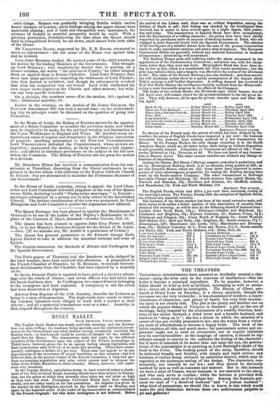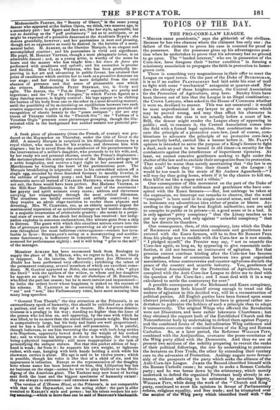THE THEATRES.
THEATRICAL entertainments have assumed so decidedly sensual a cha- racter—using the term only as the converse of intellectual—that the ballet is become a principal ingredient. To be popular, however, a ballet should be brief as well as brilliant, interesting as well as attrac- tive; above all, it should be intelligible. The Beauty of Ghent, pro- duced at Drury Lane on Saturday, is a showy spectacle, though the costumes are not very recherché; it has abundance of incident, a super- abundance of characters, and plenty of bustle, but very little interest: the story is not clearly told. The plot is the pretty and familiar one on which the popular drama of Victories is founded: a girl on the eve of marriage, being tempted by the allurements of a wealthy libertine, hesi- tates in her choice between a titled lover and a humble husband, and resolves to "sleep on it " ; she has a dream in which the miseries of a career of vice are vividly presented to her, and she wakes from a vision- ary state of wretchedness to become a happy bride. The book of the ballet explains all this, and much more ; but pantomimic action and ex- pression ought not to need an interpreter, nor to require initiation into its conventionalities : as the language of emotion, it should be sig- nificant enough to convey to the audience the feeling of the character ; but if more is intended to be meant than can meet the eye, the gesticu- lation of the pantomimist is as puzzling as Lord Burleigh's shake of the head in the Critic. The leading points of the story, therefore, should be indicated broadly and forcibly, with simple and rapid action; any baldness of outline being obviated by saltatorial fancies, which may be regarded as the arabesque setting of the design. The characters, con- sequently, can scarcely be too few; and they should be distinctly marked by acts as well as costumes and manner. But in this instance we have a triad of Counts, whose business is not essential to the story, and who only serve to confuse; while the heroine is provided with sister, cousin, and rival, as if to eclipse her. Among the dramatis per- SOna3 we read of "a deceived husband" and "a Jealous husband ": what kind of pantomime, we should like to know, is that which would make the nice distinction between these two unfortunates palpable to
pit and galleries _
Mademoiselle FLEURY, the " Beauty of Ghent," is the same young dancer who appeared at the Italian Opera, we think, two seasons ago, in a secondary part : her figure and face are, like her style, agreeable, but not so dazzling as the "puff preliminary " led us to anticipate, or as might be expected of a premiere danseuse at the Academie Roya'e : she dances gracefully, however ; and her pantomime is neat and pleasing, though not so expressive as could be desired in the heroine of a senti- mental ballet. M. ALBERT, as the libertine Marquis, is an elegant and accomplished courtier; and his pantomime is vivid and significant. His pupil, M. HOGITET VESTRIS, though a most phlegmatic lover, is an admirable dancer ; and, as a young artist, is worthy of the name he bears and the master who has taught him : his tours de force are performed with steadiness and aplomb ; and his execution is precise and finished. Miss CLARA. WEBSTER, who has been gradually im- proving in her art and advancing in public favour, has attained that point of excellence which entitles her to rank as a premiere danseuse on our stage ; and her dancing is the more delightful from the total absence of pretence and that sense of pleasurable ease which she evinces. Mademoiselle PETIT STEPHAN, too, is lively and agile. The dances, the "Pas de Diane" especially, are pretty and ingenious ; and the "Pas de l'Ivrogne," in which PAYNE figures as a tipsy dancing-master, is highly comical : his legs appear to be shifting the burden of his body from one to the other in a most diverting manner, until the possibility of its maintaining an equilibrium between two such evasive supporters is quite a phaenomenon. The costumes preclude all recognition of classic beauty in the "poses antiques " ; nor are any traces of TENIERS visible in the "Flemish fete": the "Tableau of a Venetian Orgie " presents some picturesque grouping, though the illu- minated villa in the background has neither natural nor pictorial pro- priety.



























 Previous page
Previous page